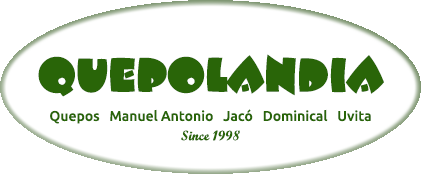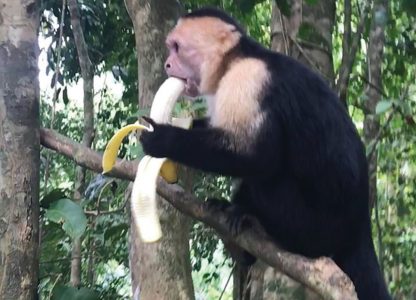DO NOT Feed the Wildlife!
Hello again Quepolandia readers! Its Karma, the spokes-kid for Kids Saving The Rainforest. Today, we are going to be talking a little bit about feeding wildlife, and how it affects them. You might think feeding wildlife is harmless fun, but you are actually hurting the animals and putting them in danger. Here are ten reasons not to feed wildlife you may not have thought of.
- Monkeys are very susceptible to diseases on human hands. They can even die from the bacteria transferred off your hand that has no effect on you. We can also get diseases from them.
- Migration to human-populated areas increases the risk of dog attacks, electrocutions, and being hit by cars.
- Abnormal feeding leads to aggressive behavior.
- Contrary to the stereotype, bananas are terrible for monkeys! Bananas have a lot of sugar in them . The sugar leads to aggression, sugar addiction, and sometimes their teeth will even rot out!
- Feeding wildlife creates a dangerous dependency on humans. That diminishes the animal’s survival abilities. Their whole lives are based around finding food in the wild, and feeding them changes their habits of looking for wild foods such as seeds, insects, small lizards, and fruits growing in trees.
- Contact with humans facilitates poaching and the pet trade.
- Pregnant monkeys who are fed bananas, will not give birth to healthy babies. The babies will be malnourished, or die before birth.
- Monkeys need to travel an average of 17 kilometers each day to be in good physical condition. Once people start feeding them, they stop traveling for their natural foraging.
- Not only do we pass disease on to wildlife, but they can pass diseases to us as well.
- The Law of the Wildlife says that it is prohibited to feed wild animals unless they are going to die. This is the rainforest. There is plenty of food everywhere, and animals don’t need our help to get it!
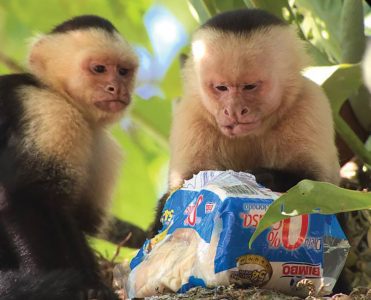 Costa Rica is a great place to visit to see wildlife, but we have to respect them and keep them wild and free! If you are a visitor to our area, please respect the wildlife and never try to feed or touch any animal. Feeding a wild animal one time can a have long-lasting impact on that animal’s life. If they are not expecting food from humans, you will be able to observe and photograph wildlife in a much more natural way.
Costa Rica is a great place to visit to see wildlife, but we have to respect them and keep them wild and free! If you are a visitor to our area, please respect the wildlife and never try to feed or touch any animal. Feeding a wild animal one time can a have long-lasting impact on that animal’s life. If they are not expecting food from humans, you will be able to observe and photograph wildlife in a much more natural way.
Another great tip is not to use your flash when photographing animals. It bothers their eyes, especially nocturnal animals like the two-fingered sloth. The flash blinds them, and they can’t see where they are going, which is probably to the safety of a tree. Crowding animals also
really stresses them out!
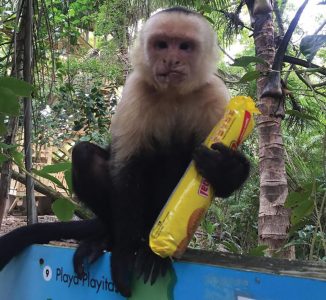 If you are a local, please help us educate our visitors on how to be respectful to wildlife.
If you are a local, please help us educate our visitors on how to be respectful to wildlife.
Contact us at [email protected] if you would like a hand-out to hang up about reasons not to feed wildlife in your hotel, business, or rental home. Well, now you know why it is bad to feed the wildlife. I hope that if you have fed the wildlife, you have now learned from your mistakes. Everyone can change for the better! If you see someone feeding wildlife, try to talk to them about all the really bad effects this can have on that animal. Even if you are a kid, use your voice and speak up for wildlife! Keep our planet natural, and healthy! Don’t forget, if you find injured or orphaned wildlife, contact our veterinarian via What’s App at our emergency animal line, 88-ANIMAL. See you next time!
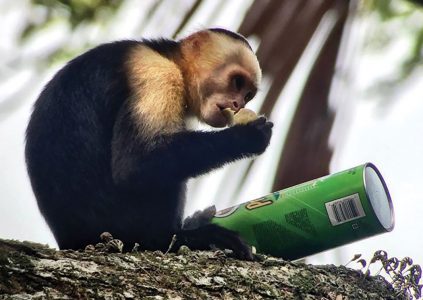 *A special thanks to Manuel Cabalceta of Manuel’s Tours, an experienced naturalist tour guide that helps show visitors the wonders of the rainforest in Manuel Antonio National Park. He works hard to educate people on how to treat wildlife while in our area, and was kind enough to provide these photos he has taken of monkeys being fed by humans in order to help educate the public and stop this negative behavior.
*A special thanks to Manuel Cabalceta of Manuel’s Tours, an experienced naturalist tour guide that helps show visitors the wonders of the rainforest in Manuel Antonio National Park. He works hard to educate people on how to treat wildlife while in our area, and was kind enough to provide these photos he has taken of monkeys being fed by humans in order to help educate the public and stop this negative behavior.
